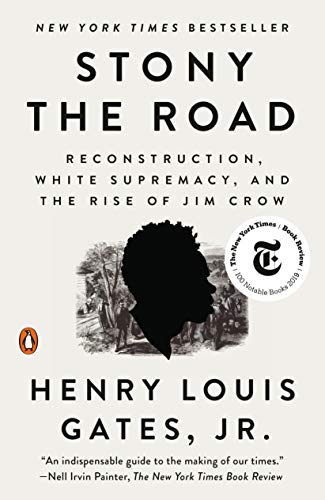Gates, Henry Louis, Jr. Stony the Road: Reconstruction, White Supremacy, and the Rise of Jim Crow. New York: Penguin, 2020.
In the course of moving in the spring of 2021, I discovered a number of books that I had meant to read at one point, but had somehow slipped through the figurative cracks in my bookshelf and had never made their way officially into my queue. One of those was Henry Louis Gates, Jr.’s Stony the Road, and as the manufactured panic surrounding “Critical Race Theory” in schools swirled in February of 2022, I finally got around to reading what turned out to be a fascinating case study in the foundations of modern anti-black racism and the resistance it engendered among the African American community.
You would be forgiven for reading Gates’s subtitle and expecting a fairly general history of the birth, life, and premature death of Reconstruction, albeit perhaps more focused on the realities of the triumphs and travails of the recently freed slaves attempting to grasp their own American dreams before being forced back into pseudo-slavery and Jim Crow. Stony the Road, however, is in fact a much more targeted monograph. Moving briskly through an abbreviated summary of Reconstruction, Gates settles on an in-depth examination instead on the period of Redemption, when Southerners rolled back the gains of Reconstruction and “redeemed” their state governments through the rule of white supremacy. This was accomplished and justified, in part, by one of the most successful propaganda campaigns in history. Not only was this the period that saw the birth of the Lost Cause, this was the genesis of a fusion of “scientific” (really pseudo-scientific) racism and mass media into an incredibly enduring attack on the character and, indeed, basic humanity of black people in order to convince American society and the world that formerly enslaved person really didn’t deserve freedom, let alone civil rights, after all. As a literary critic, not technically an historian, Gates excels when dissecting this propaganda, made all the more poignant by extensive “visual essays” of curated material that follow each chapter. Stony the Road ultimately argues that this assault on black personhood was so succesful that it led directly the the “New Negro” movement, which focused on politics of respectability, a differentiation between affluent, educated, “New” black people in Northern cities and the “Old,” thoroughly discredited, black people toiling in the sharecropping systems of the Jim Crow South. This mindset would eventually result in the Harlem Renaissance and other attempts to in turn “redeem” black culture through literature and the arts, an attempt doomed to fail due to its rejection of the political activism of Reconstruction, without which no civil rights campaign could ever realistically succeed.
For all its strengths of analysis and rhetoric, Stony the Road did contain some minor flaws that prevent me from recommending it more broadly. Familiarity with the century of American history running broadly from 1865 to 1965 is not strictly necessary for understanding Gates’ material, but certainly enhances it. Some of Gates’ analysis, too, was too esoterically literary for my tastes (I am often a “the curtains were just blue” kind of literary critic), and his lack of specific references between textual analysis and visual essay chipped away at the effectiveness of his analysis at times.
While these admittedly minor flaws may render it unsuitable (in my own estimation) to be a truly introductory text to the roots of America’s pernicious modern systems and assumptions of racism, I still highly recommend Gates’ work for any interested in exploring one of the darkest periods in American history, called here and elsewhere the “nadir’ of American race relations. As this material becomes increasingly vilified and removed from schools, it may indeed be the only place to find its accurate recounting.
